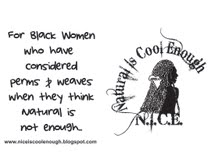The film 12 Years A Slave is a stunning, authentic, riveting film that reverberates with authenticity. As this blog is about natural hair, let me begin there. There is no pretense, no processing and no faking in terms of the natural hair...kinky, real, naturally beautiful...the glory of the African heritage of every Black individual in the film shines through and that is N.I.C.E. Even when Solomon and his family are free, you don't get a sense of loss of connectivity to one's natural state but a sense of conformity, within the context of what freedom meant, in terms of style at that time. However, as important as hair is to the discourse of this blog, I must move on to focus on the greater and more significant implications of this film.
There is so much to this film that I am not sure where to begin, but suffice it to say that it is a difficult but powerful piece that enables you to become a part of a tragically, horrific experience with great empathy, compassion, love and understanding for the Black people in it. As you watch Solomon lose his freedom and then suffer and watch the tragic experiences of the other slaves, you feel his pain. The cinematography is superb and visually appealing which becomes all to real when the visual clarity draws you into imagery you don't want to see. These images include the lashing of skin emerging in sores and blood, lynching, rape, and other vile scenes, that are shown with such candor that they are difficult to watch. Even the beautiful cotton and sugar cane plants are presented in their splendor, only for you to feel animosity towards their beauty. I also felt deeply saddened as I watched the mother whose children were sold, away from her lament day after day for them. There was no comfort for her. It was impossible to suppress her despair and as a mother, I believe that is exactly the way it would have been, in terms of the grief expressed by the young mother.
Additionally, the hanging scene with Solomon, which is beyond what anyone would want to observe in a film but it is a must to make clear the depth of cruelty that he experienced. My eyes focused on his feet barely touching the ground with just enough force to keep him from dying from the noose around his neck. This was a scene that was almost too much to handle as the folks in the background just went on as if it was not happening. There was such acclimation to atrocities, on behalf of the slaves, that the individuals were not phased by what was happening right in front of them. How could this be? This is what you wonder as you are watching him near death literally struggling for every breath. How is it possible that no one will help him? Even the quenching of his thirst with water by the young woman seems less than worthy of acknowledgement. It was not enough, by any stretch of the word, for one to label her action as compassion as she left him hanging there, seemingly fearful of her own self-preservation. But, what I appreciated most about the film, was being able to think with Solomon, as he contemplated his freedom, with a long stare, once he knows that a letter is going to be written and delivered to his friends, to secure his freedom. My mind was racing, as I am sure his was, about what it will be like for him to be free again. It renewed my belief in the importance of silence for contemplation and thinking. Also, as Patsy, the beautiful young woman whose suffering was beyond belief was beaten relentlessly by Solomon, I felt for him being forced to do so, and for her whose flesh bore the brunt of the anguish. The animosity toward the slave master at that moment for me, was beyond where I like to go in regard to disdain for another human being.
Nevertheless, I've already said to much as I don't want to ruin the film for others who want to go and see it, but it is not a film that you can watch and then walk away with a mere comment that the film was great or intriguing, etc. You have to talk, think or write about it, in some way acknowledging and determining how it impacted you. As a person of African descent, knowing that my ancestors more than likely experienced such atrocities as slaves, I think it is important to share with others that this film is worthy of seeing. My advice is that if you are squeamish about violations of individuals most personal and private rights, suffering and anguish then this film is not for you. If you are subject to intense emotions around painful subject matter or generally want to avoid the reality of what took place on the soil of this nation in regard to Black people during slavery (including the understanding that such awful realities took place well beyond slavery and not just in the south, with failure of full acknowledgement of the horrific depth of the situation), then perhaps this movie is not for you. But, if you want to face the reality of slavery in full force, with intensity, while embracing and recognizing the truth of it all, and can handle the feelings that will arise in you consequently, then go and get your ticket, sit there and take it all in. You will not laugh, not even for a moment, but you may feel sad, perhaps cry and feel intense emotion. You may also feel deep love and compassion for Solomon, Patsy, the wailing mother and the other slaves and a sense of gratitude towards the young man who agreed to write and distribute the letter, which leads to Solomon's freedom. Seeing this film is the least that we can all do in recognizing a harsh reality carefully and beautifully shared with us through an intriguing film that speaks truth and that ends in resounding love.













No comments:
Post a Comment